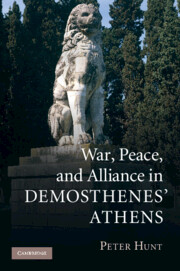Book contents
- Frontmatter
- Contents
- Acknowledgments
- Abbreviations, translations, and inscriptions
- 1 Introduction
- 2 Economics
- 3 Militarism
- 4 The unequal treatment of states
- 5 Household metaphors
- 6 Defense and attack
- 7 Calculations of interest
- 8 Reciprocity
- 9 Legalism
- 10 Peace
- 11 Conclusion
- Appendix 1 Speeches and texts
- Appendix 2 Plato and Aristotle on the causes of war
- Appendix 3 Claims of service
- References
- Index
Appendix 2 - Plato and Aristotle on the causes of war
Published online by Cambridge University Press: 05 May 2010
- Frontmatter
- Contents
- Acknowledgments
- Abbreviations, translations, and inscriptions
- 1 Introduction
- 2 Economics
- 3 Militarism
- 4 The unequal treatment of states
- 5 Household metaphors
- 6 Defense and attack
- 7 Calculations of interest
- 8 Reciprocity
- 9 Legalism
- 10 Peace
- 11 Conclusion
- Appendix 1 Speeches and texts
- Appendix 2 Plato and Aristotle on the causes of war
- Appendix 3 Claims of service
- References
- Index
Summary
In the Republic Plato argues for a purely materialist and internal explanation for war: states attack their neighbors to gain their possessions, especially their land. He can imagine a city fighting such a war to escape poverty: the people in the Republic's original, self-sufficient city will not have too many children “lest they fall into either poverty or war.” But the main thrust of his argument is that the “unlimited acquisition of wealth, disregarding the limit set by our necessary wants” drives cities to war.” In the Phaedo Plato specifies the reason why people want “wealth and luxuries” and sums up the entire causal chain:
It [the body] fills us with wants, desires, fears, all sorts of illusions and much nonsense…Only the body and its desires cause war, civil discord and battles, for all wars are due to the desire to acquire wealth, and it is the body and the care of it, to which we are enslaved, which compels us to acquire wealth, and all this makes us too busy to practice philosophy.
Plato thus attributes the drive to war to the desires of the body and links it with a deplorable lack of individual self-restraint. These attitudes find parallels among critics of Athenian foreign policy such as Isocrates.
Aristotle does not provide an overarching theory of the cause of war, but he too mentions material motivations for war.
- Type
- Chapter
- Information
- War, Peace, and Alliance in Demosthenes' Athens , pp. 276 - 278Publisher: Cambridge University PressPrint publication year: 2010



